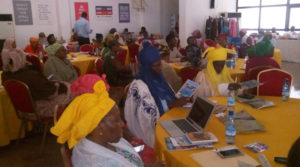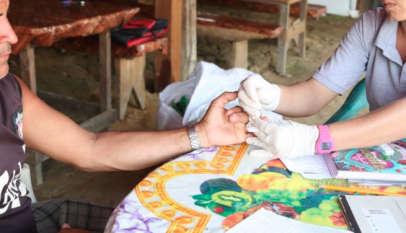Day New Faces New Voices was formally launched in Nigeria

The formal launch of the Nigeria chapter of New Faces New Voices (NFNV) under the theme: “The Role of Women in Recession and Economic Development in Nigeria” had in attendance eminent Nigerian women from across government, the business community, banking and financial institutions and international organisations
The New Faces New Voices (NFNV) is a pan-African advocacy network founded by Graça Machel, the widow of the Late Nelson Mandela, with the aim of increasing African women’s access to finance and financial services as well as strengthening the capacity of women entrepreneurs out of the belief that women have the potential to deliver a significant contribution to economic growth in Africa.
Thus far, the women-focused nonprofit has country chapters in 16 African countries including Cameroon, Côte d’Ivoire, the Democratic Republic of Congo, Egypt, Ethiopia, and Kenya. Others are Mozambique, Niger, Nigeria, Rwanda, Senegal, South Africa, Tanzania, Uganda, Zambia and Zimbabwe.
Although the Nigeria chapter of NFNV has been in existence since 2012 it was only formally launched last week Monday in Abuja, the Nigerian capital, in an event that attracted eminent Nigerian women from across government, banking and financial institutions, as well as international organisations.
In her welcome address at the event, Country Director of New Faces New Voices in Nigeria, Aishatu Debola Aminu, said NFNV’s core objectives were increasing women’s access to finance and financial services, strengthening the skills and capacity of women as entrepreneurs, consumers and investors in the African economy as well as facilitating opportunities and prospects for women in the leadership and decision-making levels within financial institutions and the African society at large.
Aishatu Aminu, who acknowledged the untiring support of the country chapter’s Grand Patron, Her Excellency (Dr) Amina Namadi Sambo added that NFNV Nigeria had already been partnering several Nigerian NGOs and financial institutions to build the capacity of Nigerian women entrepreneurs and help them access finance including working with numerous rural women entrepreneur groups to develop the culture of banking and savings.
“Our team played crucial roles on numerous issues affecting socio-economic status of women in Nigeria. Part of the activities we conducted included the signing of a Memorandum of Understanding with Grassroots Micro-finance Bank to facilitate the disbursement of credit facilities to viable women’s enterprises. We also formed strategic partnerships with other NGOs in organizing business clinics for women entrepreneurs,” she said.
The launch event which was themed: “The Role of Women in Recession and Economic Development in Nigeria” had as keynote speaker, Tinuola Thompson-Ajayi, a two-time chairperson of the Association of Professional Women Bankers (APWB) [of Nigeria] and Fellow of the Chartered Institute of Bankers of Nigeria (FCIB).
In the keynote address, Mrs Thompson-Ajayi who, among others, said Nigerian women supplied 70% of the country’s agricultural labor argued that the economic recession in Nigeria would not consume it instead; the country had all it takes to consume the recession in the form of its teeming female population.
“Nigeria cannot fully maximize labor and capital growth without the input of women,” she said. “Statistics show that Nigerian women supply 70% of agricultural labor; provide 50% of animal husbandry related activities; they are involved in 60% of food processing and women play a vital role in the maintenance of their families, investing as much as 90% of their income in the families compared to 35% for the men.”
Mrs Thompson-Ajayi said since women constitute over 50% of Africa’s most populous nation (Nigeria), women were “too big and too relevant to be ignored” or relegated when it comes to efforts to end recession in the country arguing that there was no gainsaying in the fact that an empowered female workforce was capable of helping to reverse the recession.
“Economically, women constitute the majority of the peasant labor force in the agricultural sector, thus contributing tremendously to agricultural output. Unfortunately we, women, hardly benefit from agricultural incentives and innovation, largely owing to the nature and structure of such incentives e.g requiring assets as collaterals,” she complained.

“The path you are treading is an uncharted one because even when a woman know her rights if she is not economically empowered there is a problem,” says the chairperson of the event, Justice Fati Abdulsalam Abubakar, a former Nigerian First Lady and founder of Nigeria’s leading women’s rights NGO, the Women’s Rights Advancement and Protection Alternative (WRAPA) who was represented by Hajiya Saudatu Mahdi, WRAPA’s secretary general.
“We are therefore calling on the National Assembly to come up with laws that will support women’s economic empowerment. We must move away from a socialization whereby women will only be seen but not to be heard. We are on the road to a generational shift; there is a realization that we must change the economic plight of the Nigerian woman. And WRAPA is going to partner NFNV Nigeria to see to the economic empowerment of Nigerian women.”
I her goodwill message read at the event, Mrs Graca Machel, Founder of both the Graca Machel Trust and New Faces New Voices (NFNV) said if Africa as a continent was to succeed in achieving financial and economic sustainability, all role players needed to work collectively to bring about a transformed financial sector, “one that is inclusive and accommodates the realistic needs of the continent’s women regardless of the level at which they participate in the economy.”
“The theme of today’s launch,” says Mrs Machel “ ‘The Role of Women in Recession and Economic Development in Nigeria’ is very apt – as now more than ever we need to actively embrace the economic force of the continent’s women entrepreneurs and business leaders. Women have been participating [in] the economy despite significant and sometime overwhelming challenges.”
In a similar goodwill message, Tunde Omoyeni, the representative of the International Organisation for Migration’s mission in Nigeria said the role of women in national development cannot be overemphasized adding that migration and development were closely linked. “If well managed, migration can lead to women’s development through the emergence of women breadwinners in African families,” he said.
In another goodwill message, Agatha Kolawole of the International Labour Organisation’s mission in Nigeria said her organization which was also focused on empowering women by promoting a decent working environment for them was in support of NFNV Nigeria’s work with women.
“We are in support of New Faces New Voices Nigeria’s work of supporting women. We want to ensure women in Nigeria are economically empowered since empowered women also empower their children. ILO is against child labour,” she said.

Speaking on behalf of Mr Olusegun Awolowo, the executive director and CEO of the Nigeria Export Promotion Council (NEPC), which hosted the launch event, Mrs Evelyn Obidike, described New Faces New Voices as the Council’s “strategic partner in achieving women’s empowerment and inclusiveness through non-oil export”.
“Undoubtedly, women have a strong role to play in the present economic recessions and economic development of Nigeria. Findings of a (McKinsey) empirical survey shows that countries with greater economic opportunities for women score higher on competitiveness and national income. If women participate in the economy on an equal footing with men, it could add $28 trillion to the global economy by 2025,” said Obidike.
Speaking about the SheTrades Initiative of the International Trade Centre, Obidike said the Initiative was aimed at connecting one million women to markets by providing buyers for their products from across the globe by 2020 adding that Nigeria would connect 200,000 women entrepreneurs to global markets in the coming years through the Initiative.
“I therefore urge the management and members of NFNV Nigeria to leverage on the SheTrades platform to promote their businesses, make it visible, improve their skills through available e-courses, mentoring sessions, connect to buyers and sellers to expand their market,” she advised.
In her address, Grand Patron of New Faces New Voices in Nigeria, Her Excellency (Dr) Amina Namadi Sambo, wife of a former vice president of Nigeria, said NFNV had a lot to offer in the quest to uplift the status of women in Africa adding that having closely followed the activities of the Nigerian chapter she “never had any cause to regret my association with you”.
“I am never tired of contributing to women’s progress because I believe in the socioeconomic wellbeing of women; making women self-reliant. Poverty has the face of a woman, with the right push things can be improved,” argues HE Amina Sambo. “This is in line with the vision of my NGO, I Care Women and Youth Initiative, which has economic empowerment, education, health of women, youth, physically challenged as well other vulnerable people in the society as its focus.”
She also commended NFNV Nigeria for its consistency and tireless strive to change the narrative of the African Woman, restated her commitment to continue to support the Nigeria chapter to financially empower Nigerian women and put smiles on the faces of helpless women adding that NFNV-Nigeria was also committed to partnering WRAPA to achieve its objectives.
In a goodwill message delivered at the event by the District Head of Rimin Gado, Alhaji Shehu Muhammad Dankadai, on behalf of the Emir of Kano Muhammadu Sanusi II, the Dankadai said the monarch was very committed to women’s social and economic empowerment. “I urge NFNV and WRAPA to make serious joint efforts towards women’s empowerment,” said the traditional leader.
The formal launch of the Nigeria chapter of New Faces New Voices (NFNV) – which also featured exhibition of products by members of the pan African women network as well as presentation of empowerment packages to outstanding Nigerian women entrepreneurs – will further reinvigorate the plans and activities of NFNV in Nigeria to enable the chapter drive for the quick attainment of its objectives.













